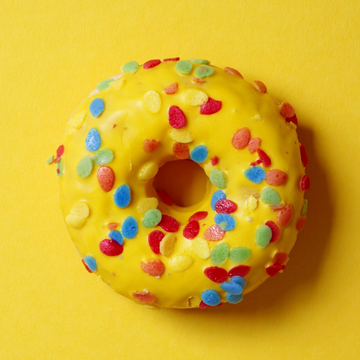Have you ever experienced a moment of pure ‘bliss’ or ‘happiness’ after eating something sweet, perhaps chocolate, ice-cream or your favourite cake? Well unfortunately, this short-lived, perceived happiness, aka the sugar high, is actually playing havoc with your brain and mood on a chemical level. From just the first taste of sugar, our brains are sent a message to activate the ‘reward/pleasure’ centre of the brain, causing it to have the same effect as socialising with good friends, laying in the sunshine on a summers day or even sex. This reward/pleasure system is activated by sugar as it causes different regions of the brain to experience a heightened sensation making sugar highly addictive to us because of these short-lived, mood-changing effects.
The main chemical that causes this biological reward/pleasure system to activate is Dopamine. Dopamine receptors are activated and it sends our body into a state of bliss which can result in a dependency on whatever substance is causing the high, for example, this could be drugs, nicotine, alcohol and to a much lesser extent, sugar, for this ‘high’ effect. Dopamine is released when we eat food however, eating the same thing all the time dumbs-down this effect leading us to seek different foods, hence why we get bored of eating the same thing when it no longer tastes as good as it once did. Scarily though, sugar does not have this effect, therefore no matter how much sugar we eat and how often we eat it, this dopamine effect never reduces like it does for other foods therefore keeping our body craving this sweetness above anything else.
It is not scientifically agreed on that sugar is actually ‘addictive’ but certainly there is much anecdotal evidence from patients that I have seen over the last 15 years as dietitian, diabetes educator and exercise physiologist who believe that after consuming a sweet food that they experience cravings for this more often. Mice studies have shown that when they are initially fed loads of sugar, and then this is removed from their diets, that they start to experience cravings and even withdrawal symptoms for sugar which lead to binging should sugar be re-introduced to their diet.
Therefore, regardless of where you consume sugar in your diet, the goal is to reduce it in all forms and to start to recognise its more disguised names such as glucose, fructose, maltose, dextrose (all those words ending in -ose), starch, all ‘syrups’ and even raw sugar, honey, agave and other sugars which are perceived as ‘more natural’ like coconut sugar etc. The side effects of sugar are endless, although I am not advocating to eliminate all sugar in the diet. Choose whole fruits, around 1-3 pieces per day depending on which types and your metabolism (ie what are your blood sugar levels like or do you have insulin resistance/pre-diabetes/diabetes). Sugar is also naturally found in the form of ‘lactose’ in plain Greek yoghurt so this is fine too for those who are not lactose intolerant as it is a low GI food which will be slowly digested but as far as processed sweet foods go, steer away from these and try to make your own sweet foods using whole fresh fruit, plain Greek/coconut/almond yoghurt and even small amounts of dried fruit in protein balls as long as they are balanced with loads of nuts and seeds for healthy fats and protein to slow digestion rate. Last but not least, frequency and portion control is key, therefore everything in moderation and if you slip up with too much 70% dark chocolate, counteract the sugar with a walk to take it immediately out of your blood stream!









